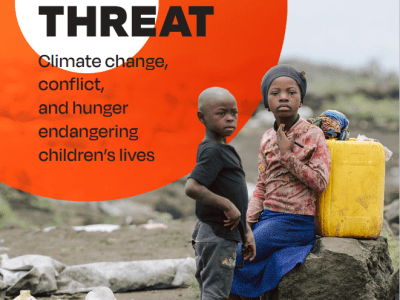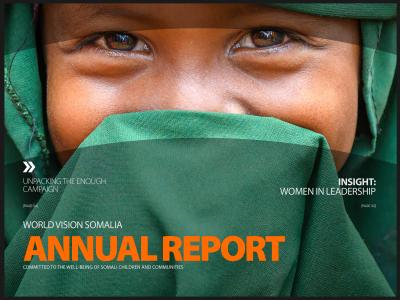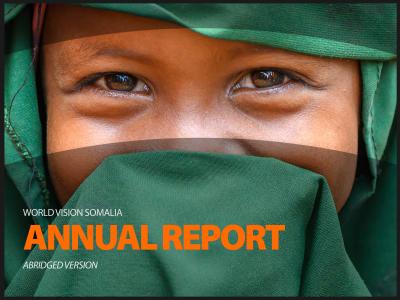article / April 7, 2025
World TB Day 2025: Somalia’s progress in the fight against TB
A young boy’s recovery from TB in Somalia shows the power of early treatment and the country’s progress in the fight to end tuberculosis.
publication / April 25, 2025
Myanmar Earthquake | Situation Update | Edition 6
World Vision is deeply concerned for the well-being of children and their families affected by the earthquake: Children are among the most affected, facing increased risks, loss of learning, and urgent protection needs. World Vision is providing life-saving relief assistance to the children and the families affected by the earthquake. We aim to support 500,000 people, including 85,057 boys and 86,902 girls, through both immediate relief and long-term recovery efforts.
press release / April 17, 2025
Climate, conflict and hunger create spiralling crisis for world’s most vulnerable
Climate change, conflict, and hunger are creating a crisis for the world's most vulnerable, with nearly 90% seeing climate change as a serious threat.
publication / April 17, 2025
Triple Threat: Climate Change, Conflict and Hunger endangering children's lives
Climate change, violence, and hunger are trapping vulnerable children in poverty. This report explores their intersection and the urgent need for action.
publication / April 21, 2025
Myanmar Earthquake | Situation Update | Edition 5
World Vision is deeply concerned for the well-being of children and their families affected by the earthquake: Children are among the most affected, facing increased risks, loss of learning, and urgent protection needs. World Vision is providing life-saving relief assistance to the children and the families affected by the earthquake. We aim to support 500,000 people, including 85,057 boys and 86,902 girls, through both immediate relief and long-term recovery efforts.
publication / April 16, 2025
Myanmar Earthquake | Situation Update | Edition 4
World Vision is deeply concerned for the well-being of children and their families affected by the earthquake: Children are among the most affected, facing increased risks, loss of learning, and urgent protection needs. World Vision is providing life-saving relief assistance to the children and the families affected by the earthquake. We aim to support 500,000 people, including 85,057 boys and 86,902 girls, through both immediate relief and long-term recovery efforts.
article / March 23, 2025
Commemorating World TB Day 2025: Reflections on Somalia’s Progress in the Fight Against TB
TB remains one of Somalia’s most pressing public health threats, yet progress is underway. Through Global Fund investments and World Vision Somalia’s leadership, significant strides are being made in detection, treatment, and prevention, despite challenges such as drought, conflict, and displacement.
As we commemorate World TB Day 2025, we reflect on Somalia’s achievements, ongoing challenges, and the path forward toward eradicating TB. For it is unacceptable that anyone should suffer or die from a curable disease
publication / February 27, 2025
World Vision Somalia FY 2024 Annual Report
World Vision Somalia’s Impact in 2024
In 2024, Somalia faced relentless shocks, from devastating floods and ongoing conflict to economic instability, leaving millions struggling to meet their basic needs. With 6.9 million people, including 5 million children, in urgent need, World Vision Somalia, alongside our dedicated partners, stepped up to deliver life-saving assistance and long-term resilience programmes to help communities meet immediate needs, recover, and rebuild.
We reached 1.4 million people, nearly 850,000 of them children, providing emergency aid, food security, healthcare, nutrition, clean water, education, and more.
From launching our first-ever boat-based emergency response to leading evacuation efforts during historic floods, our dedicated teams stood on the frontlines of hope for children and their communities.
We invite you to read this report and see how, together, we made a difference for children.
publication / April 14, 2025
Myanmar Earthquake | Situation Update | Edition 3
World Vision is deeply concerned for the well-being of children and their families affected by the earthquake: Children are among the most affected, facing increased risks, loss of learning, and urgent protection needs. World Vision is providing life-saving relief assistance to the children and the families affected by the earthquake. We aim to support 500,000 people, including 85,057 boys and 86,902 girls, through both immediate relief and long-term recovery efforts.
publication / February 27, 2025
World Vision Somalia FY 2024 Annual Report Abridged Version
In 2024, Somalia faced relentless shocks, from devastating floods and ongoing conflict to economic instability, leaving millions struggling to meet their basic needs. With 6.9 million people, including 5 million children, in urgent need, World Vision Somalia, alongside our dedicated partners, stepped up to deliver life-saving assistance and long-term resilience programmes to help communities meet immediate needs, recover, and rebuild.
We reached 1.4 million people, nearly 850,000 of them children, providing emergency aid, food security, healthcare, nutrition, clean water, education, and more.
From launching our first-ever boat-based emergency response to leading evacuation efforts during historic floods, our dedicated teams stood on the frontlines of hope for children and their communities.
We invite you to explore this abridged version of the report and see how, together, we made a difference for children.









